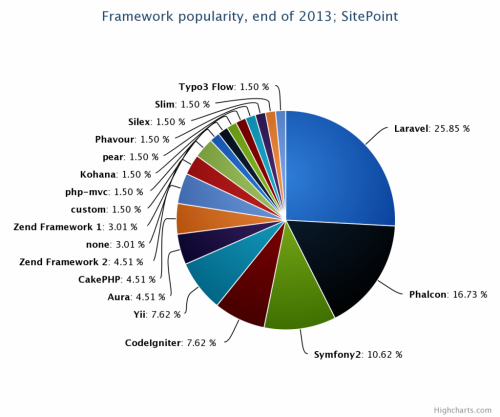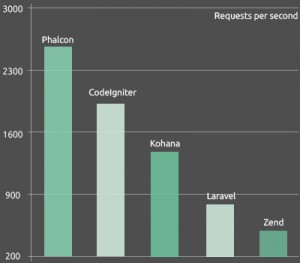Home >Backend Development >PHP Tutorial >PHP development framework popularity ranking: Laravel ranks first
PHP development framework popularity ranking: Laravel ranks first
- 伊谢尔伦Original
- 2016-11-25 11:48:321041browse
In project development, some architectures and codes are repeated. In order to avoid duplication of work, various frameworks were born.
In PHP development, choosing the right framework can help speed up software development, save valuable project time, and allow developers to focus on the implementation of functions. Using popular frameworks also helps create more stable and secure applications since they are proven by numerous projects.
Sitepoint website conducted a small survey to see which PHP framework PHP developers like to use the most. The survey results show that the top three most popular PHP frameworks are: Laravel, Phalcon, and Symfony2.

Laravel - Master-level PHP development framework
Laravel is a simple and elegant PHP web development framework that can liberate developers from spaghetti code through simplicity and elegance , expression syntax to develop great web applications. Laravel has more expressive syntax, high-quality documentation, and rich extension packages, and is known as the "master-level PHP development framework."

2. Phalcon - the fastest PHP framework
Phalcon is an open source, full-stack, PHP5 framework written in C language, which provides developers with a large number of tools required for website and application development. High-level tools, and Phalcon is loosely coupled, developers can use other components as needed. All functions in Phalcon are presented as PHP classes. Developers do not need to learn and use C language, and there is no need to worry about performance issues.
Superior performance, power and ease of use are the main factors that make Phalcon popular.

3. Symfony2 - a combination of development speed and performance
Symfony2 is an open source PHP Web framework with the characteristics of fast development speed and high performance. Compared with other frameworks, Symfony2's advantages include: supporting DI (dependency injection) and IoC (inversion of control); strong scalability; and relatively mature documentation and community. However, the learning curve of Symfony2 is also relatively steep, and inexperienced beginners often need some practice to master its features.

Which frame in the picture above is your favorite? Comments welcome.

